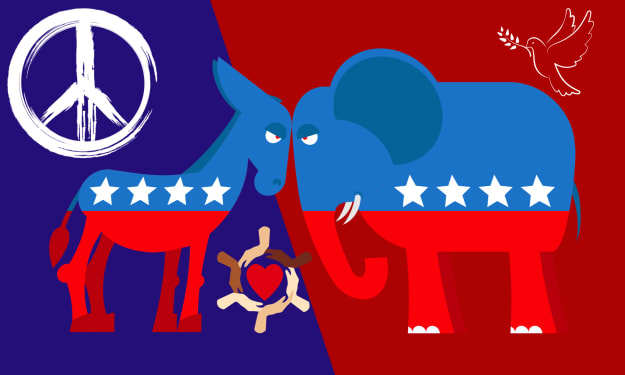finance
Money talks; reviewing the global economy, government spending, taxes, and economic policy that affect our social and political future.
"Socially Liberal, Fiscally Conservative"
In the endless void of political ideologies, there exists a character familiar to many: the friend who proudly proclaims, "I'm socially liberal, but fiscally conservative." It's a statement often presented as a badge of rationality, a stance that ostensibly combines progressive values with prudent financial management. Yet, beneath the alleged sense of reason often lies a fundamental flaw, and one that warrants scrutiny and dissection.
William EvansPublished 2 months ago in The Swamp

Save the planet by population reduction-yes or no?
Save the planet by population reduction-yes or no? What will be the result if populations fall? Saving the planet has become an excuse for just about every “official” action and for official “non-action.” It is used to validate economic coercion on every level of every nation.
Peter RosePublished 2 months ago in The SwampThe Marketing of Economics
When we think of Marketing we typically think of the everyday items that get pushed into our psyche's from billboards to much more recently, our "For you" pages on various Social Media platforms. But Marketing is very much so a part of our day to day lives, even within items that we've already bought. The common person would think that once an item is sold, that item doesn't need to do much in the way of upselling anything else but unfortunately, that isn't true.
Quaker-nomicsPublished 2 months ago in The Swamp

Economic governance in the 21st century
Economic governance in the 21st century A global problem waiting to be solved. While this is a worldwide concern, it is a good example to take the exposure of the financial mess, the socialist devolved government of Scotland, is in. (December 2023) This raises genuine concerns about socialist economics. The usual cry of tax the rich is just politics of envy. If anyone doubt the economic advantages of a mixed economy, they should ask themselves why all the economic migrants come to nations with mixed economies, they do not flood Russia in their millions, they leave Venezuela and try to get to USA. Socialist economic do not work in the real world. The SNP in Scotland claim they want total and complete independence from the rest of Britain, they suggest they will have a vibrant and wonderful economy full of advantages for the Scottish people. Recent revelations show that even with huge subsidies from British taxpayers, they still cannot manage their state-run services properly. They have resorted to the usual complaints that they are not given enough of British taxpayer’s money. If they have independence, they will have Zero money from English tax income. Do they expect the EU will welcome them and provide all the money they need? Do they honestly think French and German taxpayers are going to agree to this?
Peter RosePublished 4 months ago in The SwampEverything Donald Trump Accomplished as President of the United States
Donald Trump's presidency was a tumultuous era in American politics, marked by a myriad of accomplishments and controversies. From his successful business ventures to his unconventional political ascent, Trump's presidency left a significant impact on the nation. Let's delve into the various aspects of his tenure and evaluate the accomplishments that defined his time in office.
Timothy A RowlandPublished 4 months ago in The SwampWhy, When, and How was the Republican Party Formed in the United States
Introduction The birth of the Republican Party stands as a monumental moment in American political history. Understanding its roots involves delving into the rich tapestry of the nation's past and the fervent ideological undercurrents that shaped its inception.
Timothy A RowlandPublished 4 months ago in The Swamp

Political Standings Not Withstanding
A Message of Unity in Modern Political Division Across the United States, the country is divided by political views and beliefs. The level of division that currently exists in 2023, in fact, has not been seen in many decades, maybe even centuries. It could be argued that the USA has not been this divided since the days leading up to the civil war.
Timothy A RowlandPublished 4 months ago in The SwampYOUTUBE
**YouTube: A Journey from Inception to Global Dominance** YouTube, the behemoth of online video streaming, has come a long way since its humble beginnings. Established in February 2005 by three former PayPal employees—Chad Hurley, Steve Chen, and Jawed Karim—YouTube has evolved into a cultural phenomenon that has reshaped the way we consume and share content.


Private Enterprise vs Public Service
Introduction This is not a rant against good private enterprise, but it is NOT a public service, despite many politicians telling us that certain ones are. This is a bit of observational history and why the world is in such a terrible economic and climactic state because of people being sold the new god of money.
Mike Singleton - MikeydredPublished 5 months ago in The Swamp

Moving people from Benefits(Welfare) to employment
Moving people from benefits (welfare) to employment Not just a British problem. A big problem in year 2023 is going to get bigger by 2050.
Peter RosePublished 5 months ago in The Swamp

A Victim of Ignorance and Greed
Most of my adult life, I have been a renter or a guest. As a child, I was not expected to contribute financially to my mother's rent or mortgage payments. However, after high school graduation, as an independent adult, I was expect to afford my own housing. That expectation is not unfair, but for over 30 years, I have witnessed and experienced many leases or contracts or rental agreements that have been unfair and according to American history, illegal.
Shanon NormanPublished 5 months ago in The Swamp

All the Ways Joe Biden Has Made the United States Worse So Far
Introduction: Exploring the Negative Impact of Joe Biden's Policies Joe Biden's presidency has been marked by controversy and criticism, with many arguing that his policies have had a negative impact on the United States. This article aims to examine the various ways in which Joe Biden's policies have made the United States worse, focusing on key areas such as the economy, immigration, foreign relations, and public opinion.
Timothy A RowlandPublished 6 months ago in The Swamp


















